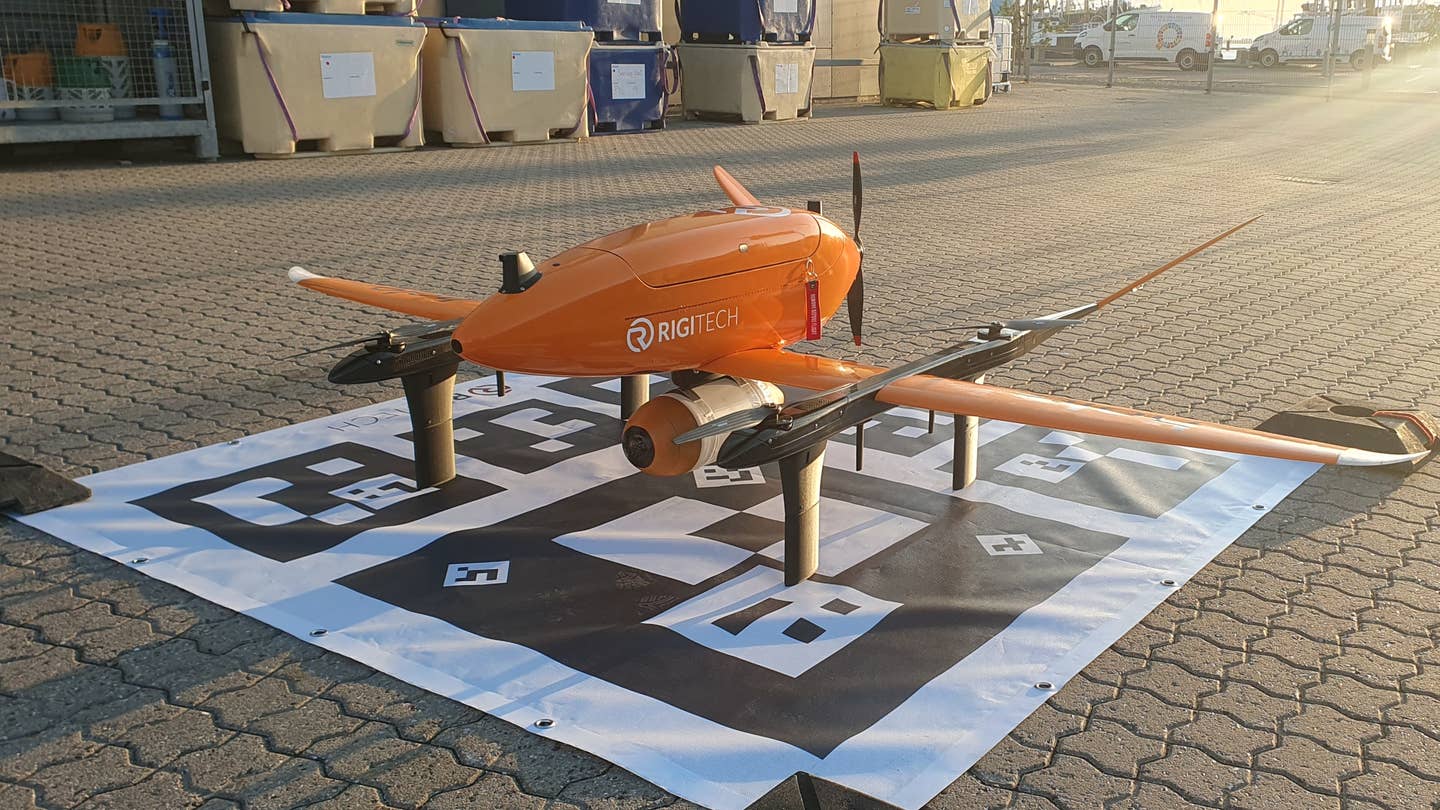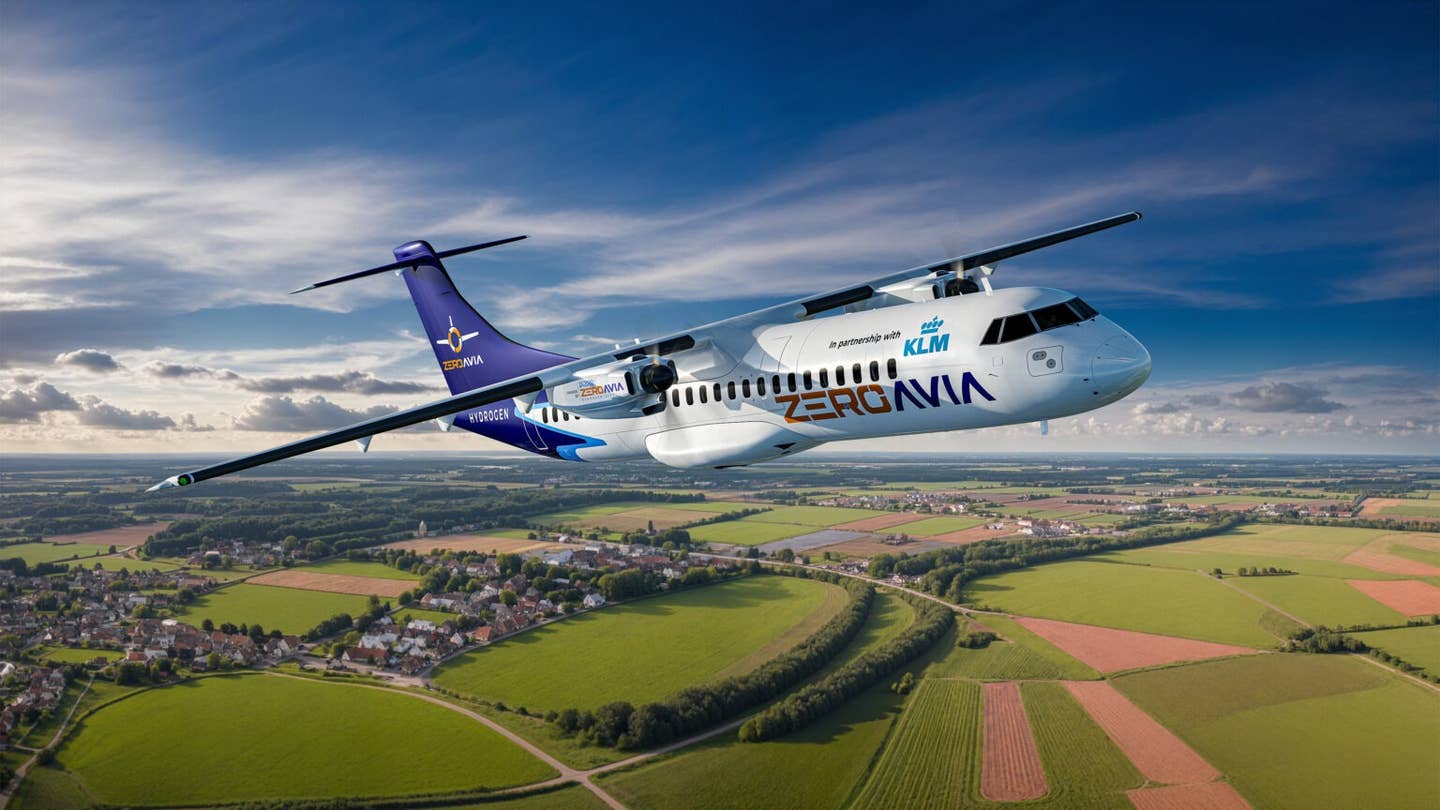Swiss Firm RigiTech Enables Drone Delivery—Without a Landing or Takeoff
The company’s prototype precision dropping system delivered wind turbine parts 20 miles offshore with a 100 percent success rate.

RigiTech’s Eiger drone, staged and ready for launch after being loaded with spare parts. [Courtesy: RigiTech]
Wind turbine maintenance is an important yet unheralded task. But drones have arrived to spice things up.
RigiTech is a Swiss drone manufacturer and operator boasting some of the most extensive beyond visual line of sight (BVLOS) flight authorizations in the industry. And it just completed a landmark test of its Eiger delivery system, flying spare parts to the Anholt Offshore Wind Farm, located 20 sm (17 nm) off the coast of Denmark. But there’s a catch—the drones didn’t need to land.
The tests marked the rollout of RigiTech’s prototype precision dropping system, which autonomously releases cargo from a few feet in the air when it detects the drone has reached its destination. That’s a game-changer in the case of offshore wind turbines, which typically do not have landing pads.
RigiTech and partners Holo and DSV made 40 deliveries, each lasting 30 minutes, to the offshore wind farm—with a 100 percent success rate—on behalf of energy company Ørsted. Remarkably, the entire operation was monitored remotely by Holo, an autonomous systems operator based in Copenhagen 83 sm (72 nm) away.
“This project started with a simple customer challenge: How do we get parts directly to a technician inside a wind turbine?” said Adam Klaptocz, CEO of RigiTech. “The solution was nothing but simple and pushed us to develop multiple cutting-edge technologies, including AI-based flight planning algorithms, precision navigation in high-wind environments, computer vision and sensor fusion algorithms. The results speak for themselves—spare parts delivered with centimeter-level precision, fully autonomously, every time.”
The Swiss company and its partners began initial testing with Ørsted in 2022. But these recent tests introduced RigiTech’s precision dropping prototype, billed as an optional add-on to the Eiger platform.
Ørsted warehouse workers loaded Eiger drones with spare parts, but from there, flights were completed entirely BVLOS. Holo technicians and Ørsted workers were able to monitor them through live video streaming, but RigiCloud—RigiTech’s AI-based logistics software—did the heavy lifting. The software determined when the drone was hovering over the 310-foot-tall turbine, initiating the supply drop autonomously.
Interestingly, only a handful of drone delivery firms are attempting to scrub the landing phase of delivery by dropping cargo from the air. The most notable is Amazon, which has struggled to match the trip volume of competitors such as Alphabet’s Wing.
RigiTech’s Eiger drone is incredibly durable, with a range of 62 miles and the ability to fly in winds as fast as 33 mph (28 knots). Configured for daytime as well as nighttime operations, it’s able to deliver between cities and rural or hard-to-reach areas alike. With a payload of 6.6 pounds and a temperature-controlled cargo hold, it’s ideal for medical and humanitarian deliveries of items such as blood or vaccines.
But Eiger’s key differentiator is its ability to be flown autonomously and remotely. That’s thanks to RigiCloud, which enables launches from tens of miles away, provides real-time flight tracking, and creates preprogrammed routes in compliance with regulatory authorities across Europe. It also tracks drone maintenance and operator credentials, which protects customers from butting heads with aviation rulemakers.
Because the European Union Aviation Safety Agency (EASA) has yet to finalize a standard BVLOS rule, RigiTech was only able to complete wind turbine tests with authorization from Denmark’s civil aviation agency. The company also owns BVLOS approvals in Switzerland, France, Italy, and the Czech Republic.
BVLOS flight is also heavily restricted in the U.S., requiring drone delivery firms to establish bases of operation and deploy visual observers close to where they fly—unless they obtain an FAA waiver. That limits most operations to small areas and makes it more challenging to expand into new markets.
RigiTech, though, has its eye on long-range deliveries in multiple countries. In March, it became the first company to launch routine BVLOS flights in France, delivering blood and biological samples between laboratories in Bourgoin-Jallieu and Tignieu-Jameyzieu, 16 miles apart. Those flights averaged just 15 minutes in duration, half the time it would take to drive.
The company also announced a partnership with U.S.-based drone operator Spright in May to deploy Eiger across its global health care delivery network. In 2020 it completed the first long-range BVLOS deliveries (20 sm or 17 nm) of biological samples in Italy. All of this is despite RigiTech being around for just five years.

Subscribe to Our Newsletter
Get the latest FLYING stories delivered directly to your inbox






